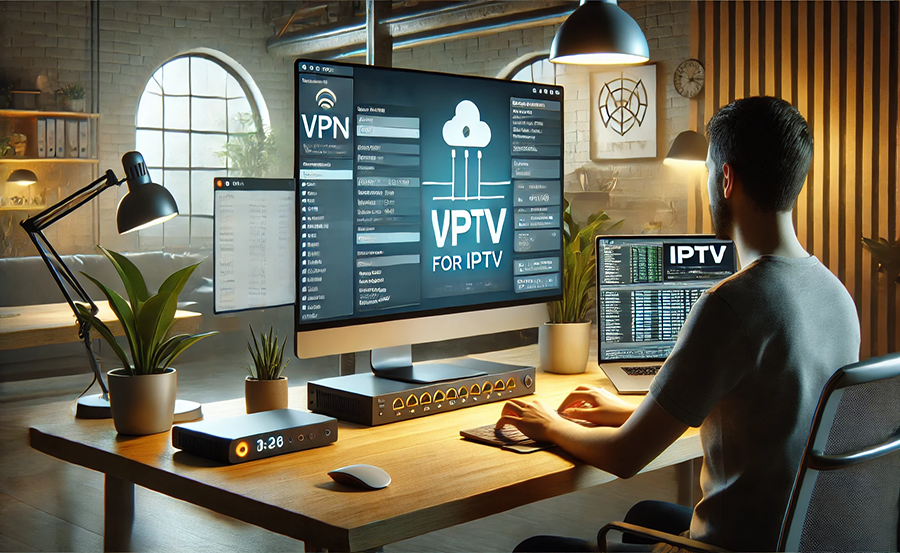As a Linux user, you value freedom, flexibility, and above all, security. But in the evolving landscape of live TV streaming, particularly IPTV (Internet Protocol Television), safeguarding your internet activity is imperative. Using a VPN, or Virtual Private Network, has become increasingly relevant. This guide explores the critical reasons why every Linux user should consider employing a VPN for IPTV, ensuring not only enhanced security but also an enriched viewing experience.
The Basics: What Is IPTV and Why You Need It
IPTV, or Internet Protocol Television, signifies a shift from traditional broadcast television. Utilizing your internet connection, IPTV offers a diverse range of TV channels and on-demand content that you can stream on various devices. Unlike cable, IPTV can be highly customizable, allowing for a more tailored viewing experience.
Linux users, known for their affinity towards open-source solutions, can appreciate the versatility of IPTV. However, navigating IPTV networks without a VPN can expose your data and restrict access due to regional differences. A VPN provides that extra layer of privacy and freedom necessary for a seamless IPTV experience.
Expert Tip:
Sports enthusiasts, rejoice! Get IPTV for sports lovers and watch live games anytime, anywhere.
Understanding the Growth of IPTV
The appetite for on-demand content is insatiable. As technology advances, so does the Internet’s capacity to deliver media content more efficiently. IPTV represents this evolution, offering greater control and choice for end-users. Popular platforms such as IPTV on Roku exemplify this transition, where users demand consistent access to their favorite content across various devices.
For Linux enthusiasts who thrive on customization and control, IPTV hosts potential. The ability to stream niche content, often unavailable on mainstream platforms, highlights why IPTV is surging in popularity. As such, securing your connection via a VPN is a logical enhancement for IPTV enthusiasts.
Unpacking the Role of VPNs in Live TV Streaming
Virtual Private Networks are increasingly indispensable in the realm of internet consumption. Given the privacy concerns and geographical content limitations, the relevance of a VPN becomes particularly significant for live TV streaming. In environments like Linux, where user agency is paramount, a VPN offers unmatched privacy and choice.
Benefits of Using a VPN for IPTV Streaming
VPNs serve as a protective layer between you and potential surveillance from cyber threats or even your Internet Service Provider (ISP). Using a VPN can help avoid throttling, a common practice among ISPs aiming to control bandwidth usage. This ensures smoother streaming without unexpected interruptions, an essential aspect of watching live TV.
Besides security, VPNs can bypass regional content restrictions. Many IPTV services offer different libraries depending on your country. A VPN can emulate various regional locations, unlocking content otherwise unavailable due to geographical boundaries.
Security and Privacy Enhancement
With IPTV pushing the boundaries of content delivery, threats have evolved as well. Using a VPN ensures that your IP address and location are masked, providing anonymity and deterring potential cyber threats. Encryption further secures data packets, rendering intercepted data illegible to unauthorized parties.
Linux users, keen on securing their system end-to-end, benefit profoundly from this fortified privacy. It’s the peace of mind of knowing that personal browsing habits or sensitive credentials remain confidential.
How a VPN Enhances Your IPTV Experience on Linux
Engaging with IPTV over a Linux operating system without a VPN can expose your online activities to various risks. Leveraging a VPN not only provides a security blanket but also enhances viewing enjoyment, aligning with the core Linux philosophy of efficiency and personalization.
Optimizing Performance with a VPN
Performance is pivotal when live streaming. VPNs can optimize this by mitigating ISP throttling, which frequently plagues IPTV users. By encrypting your internet traffic, a VPN prevents your ISP from prioritizing or deprioritizing certain services, leading to consistent streaming quality and fewer buffering issues.
Utilizing the Expert’s Guide to IPTV Enjoyment, Linux users can optimize VPN settings, choosing servers that offer the best latency and packet transfer speeds. Such adjustments significantly enhance the IPTV streaming quality, providing a close-to-perfect stream on Linux systems.
Customization and Control for Linux Experts
Linux users often pride themselves on the ability to tailor their environment to suit specific needs. VPNs align ideally with this ethos, providing tools to adjust location settings, connection protocols, and encryption methods. This capability to customize enhances your IPTV experience, ensuring it operates exactly as you desire.
Furthermore, utilizing open-source VPN configurations can demystify the privacy protocols, offering transparency often absent in proprietary solutions. For Linux users, who are accustomed to open-source benefits, this is an added advantage.
Choosing the Right VPN for IPTV on Linux
Choosing a VPN isn’t a decision to be taken lightly, especially for Linux users. Not all VPN services provide the infrastructure required to support IPTV streaming. Therefore, careful selection based on features such as speed, logging policies, and user reviews is crucial.
Assessing Features and Compatibility
Before committing to a VPN service, evaluate feature sets with your IPTV needs. Key considerations include encryption strength, server accessibility, user privacy policies, and Linux compatibility. Reliable VPNs usually offer a no-log policy, preventing VPN providers from storing user data.
Another critical factor is the VPN’s network speed and server accessibility. The more global locations available, the better the chance of circumventing geo-restricted content. Frequent travelers will find this particularly beneficial.
The Importance of Open-Source VPN Clients for Linux
For those entrenched in the open-source world of Linux, seeking VPN services compatible with open-source client management becomes essential. Open-source VPN clients provide not only transparency but can be integrated easily into Linux systems, offering the flexibility that proprietary solutions often lack.
Linux users should prioritize VPNs with community-driven clients, which can be audited, modified, and improved by the user base. Such transparency fosters trust, a core tenet of the Linux community.
Implementing a VPN for IPTV on Linux: A Step-by-Step Guide
Implementing a VPN on Linux for IPTV isn’t intimidating with the right guide. Setting up involves downloading a suitable client, establishing VPN configurations, and ensuring the connection remains secure and stable.
Installing and Configuring a VPN on Linux
The initial step is to choose a VPN client compatible with your specific Linux distribution. Common choices are OpenVPN and WireGuard. Download and install the client using your terminal or package manager, ensuring it integrates well with your desktop environment.
Configuration involves downloading server profiles from your VPN provider, enabling seamless connection setups. Ensure proper authentication keys and certificates are in place to guarantee secure connections.
Certain Pointers for Smooth Operation
Keep your VPN client up-to-date to protect against vulnerabilities. Enable kill-switch features if available to prevent accidental data exposure during connection drops. This maintains security and privacy continuity, a necessity for IPTV viewing.
Lastly, verify your connection regularly using IP leak testing to confirm that your data is truly encrypted and anonymous. These simple measures enhance the security landscape, underpinning a secure IPTV experience on Linux.
Overcoming Common Challenges: VPN and IPTV
Despite the advantages, VPN users can encounter obstacles including reduced speeds and geo-blocked content challenges. Acquiring solutions requires troubleshooting common issues, ensuring your IPTV experience remains unimpeded.
Addressing Speed Concerns
Speed loss can occur due to VPN encryption overheads. To mitigate this, select servers closest to your location or those optimized for streaming. Reducing encryption levels from AES-256 to AES-128, if acceptable, can enhance performance.
Beyond server selection, routine testing of server speeds through built-in VPN utilities can guide optimal choices. Balancing between encryption and speed is crucial for a fluid IPTV experience.
Overcoming Geo-Restrictions
VPNs are adept at bypassing geographical restrictions but can encounter blocks from specific streaming services recognizing VPN traffic. Solutions include switching servers, utilizing obfuscation techniques, or requesting assistance from your VPN provider.
Perseverance in tweaking server settings and configurations often yields results but understanding that some restrictions require continuous adjustment can prepare users for evolving challenges.
Crafting Your Ideal IPTV Experience with VPN
Integrating a VPN into your IPTV setup offers not just enhanced security but a more immersive TV streaming journey. With adaptability and protection inherently linked, Linux users can ensure that their IPTV experiences remain unhindered by conventional apprehensions.
Planning for Future IPTV Needs
Forecasting your IPTV requirements involves considering upcoming technologies, bandwidth demands, and privacy implications. With these in mind, a VPN becomes an integral part of future-proofing your IPTV enjoyment.
Keeping abreast of technological advancements allows you to adjust VPN setups for optimal IPTV usage continually. This ensures that you maximize enjoyment without compromising security.
Enhancing Quality with Expert Guidance
Applying the insights from the Expert’s Guide to IPTV Enjoyment allows for a fine-tuned experience. Understanding network configurations, bitrate adjustments, and content libraries ensures that your preferences are consistently met.
This proactive approach results in a tailored IPTV experience on Linux, enriched by a VPN’s protective and enhancing capabilities, achieving a balance between security and content access.
Frequently Asked Questions

Here are some commonly asked questions about using VPNs for IPTV on Linux:
What is the primary benefit of using a VPN for IPTV?
A VPN provides privacy by encrypting data and disguising your location. This ensures that your online viewing habits remain anonymous and protects against potential cyber threats.
Can using a VPN help access more content on IPTV?
Yes, a VPN can help bypass geographical restrictions, enabling access to content libraries that might be inaccessible in your country. This can vastly expand your viewing options.
Are there specific VPN services recommended for Linux users?
Services such as NordVPN, ExpressVPN, and CyberGhost VPN offer dedicated support and applications for Linux users, allowing seamless integration with the operating system.
Does a VPN slow down IPTV streaming?
While VPNs can sometimes reduce internet speed due to encryption processes, choosing a high-speed server and minimizing encryption levels where possible can mitigate this.
Is it legal to use a VPN with IPTV?
Using a VPN is legal in most countries and provides a lawful way to enhance security and access content. However, it’s essential to respect local laws regarding VPN and IPTV usage.
Understanding Android Box Interfaces: A Complete Beginner’s Overview





